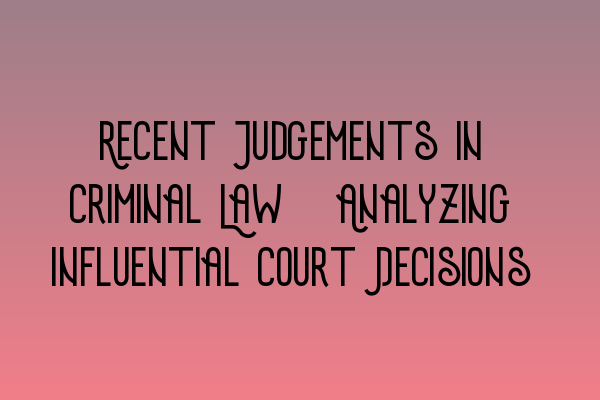Recent Judgments in Criminal Law: Analyzing Influential Court Decisions
Welcome to SQE Criminal Law & Practice Law UK, where we bring you the latest updates on criminal law and practice. In this blog post, we will delve into some of the recent judgments in criminal law that have shaped the legal landscape in the United Kingdom.
Before we begin, we would like to recommend some related articles that you may find useful:
- SQE 1 Practice Exam Questions
- SQE 1 Practice Mocks FLK1 FLK2
- SQE 2 Preparation Courses
- SQE 1 Preparation Courses
- SRA SQE Exam Dates
Now let’s turn our attention to some of the recent judgments in criminal law that have had a significant impact:
The R v Brown Case: The Boundaries of Consent
The R v Brown case, a landmark judgment, explored the boundaries of consent in relation to consensual acts involving sadomasochistic practices. The Court of Appeal ruled that consent could not be used as a defense in cases where the harm caused was deemed to be serious. This decision had far-reaching implications for cases involving consensual activities that may result in harm.
The R v Jogee Case: Joint Enterprise Liability
The R v Jogee case examined the principle of joint enterprise liability. The Supreme Court held that the principle had been incorrectly applied for decades, leading to miscarriages of justice. As a result, the law on joint enterprise liability was reformed, and new guidelines were introduced to ensure that individuals are not held criminally liable for actions they did not intend, encourage, or foresee.
The R v G and R Case: Intoxication as a Defense
In the R v G and R case, the House of Lords considered whether voluntary intoxication could be used as a defense for a specific intent crime. The court ruled that where a defendant voluntarily becomes intoxicated and commits a crime with a specific intent, they cannot rely on their intoxicated state as a defense.
The R v Ghosh Case: Dishonesty Test
The R v Ghosh case clarified the test for dishonesty in criminal law. The Court of Appeal held that the test should consist of two elements: (1) whether the defendant’s conduct was dishonest according to the ordinary standards of reasonable and honest people, and (2) whether the defendant himself realized that what he was doing was dishonest according to those standards.
The R v Lambert Case: Mens Rea for Strict Liability Offenses
Finally, the R v Lambert case examined the level of mens rea required for strict liability offenses. The House of Lords ruled that, in the absence of clear legislative intent, a defendant must have at least been reckless as to the facts constituting the offense to be found guilty of a strict liability offense. This judgment clarified the mens rea requirement for strict liability offenses.
We hope this overview of recent judgments in criminal law has given you a better understanding of the influential court decisions that shape our legal system. For more information and resources on criminal law and practice, please explore our related articles and courses listed above.
Stay tuned for more updates on criminal law and practice at SQE Criminal Law & Practice Law UK!
